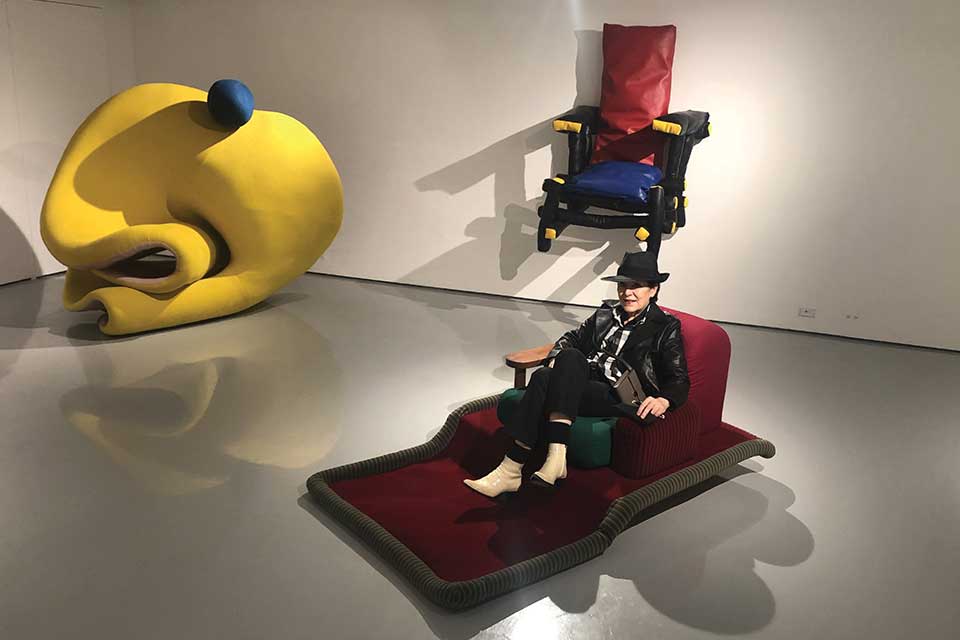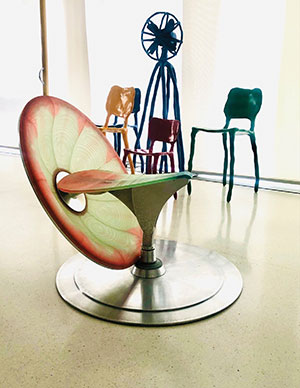
Popping Up in Pop Culture and Other Unlikely Spaces: Latinx Author Giannina Braschi Crosses Over
by Tess O’Dwyer

The avant-garde writings of Puerto Rican author Giannina Braschi have long been the subject of college courses and doctoral dissertations in fields ranging from Latin American studies and Spanglish linguistics to postmodern and postcolonial literatures. But these days her radical texts are popping up in popular culture and far-ranging spaces traditionally devoid of Latinx poetry, such as television comedy, chamber music, comics, industrial design, and even urban planning.
The quirkiest permission request of late came from the producers of the television series Modern Love based upon the eponymous column in the New York Times and featuring Anne Hathaway, Tina Fey, Ed Sheeran, and Andy Garcia. Braschi’s book United States of Banana will be a prop on the set of an upcoming episode of this romantic comedy, presumably as an objective correlative that offers some insight about a character in whose home the novel appears. If this is a set designer’s way of saying you are what you read, what should viewers assume about a character who reads radical contemporary world literature? Library Journal described United States of Banana as a bizarre but intriguing book for fans of philosophical fiction like Thus Spoke Zarathustra: A Book for All and None. Such fans are likely to be heady, creative, and up for a challenging read.
Braschi’s fans are likely to be heady, creative, and up for a challenging read.
Born in San Juan and based in Manhattan, Braschi writes cross-genre works that are structural hybrids of poetry, fiction, essay, theater, manifesto, and political philosophy. Her titles include the poetry epic Empire of Dreams, the Spanglish novel Yo-Yo Boing!, and the geopolitical tragicomedy United States of Banana about the fall of the American empire and the liberation of Puerto Rico. Her work has been widely adapted into other art forms, including paintings and wood carvings by Michael Zansky, short-short films and a photography book by Michael Somoroff, an artist’s book by Italian printmaker Giorgio Upiglio, and a staged production of United States of Banana by Colombian theater director Juan Pablo Félix.
Maritza Stanchich, professor of English at the University of Puerto Rico, observed that “Braschi’s reach has come to exceed not only the boundaries of literary genres but literature itself.” A growing number of creators are using her experimental texts as a springboard for their own cultural productions.
On the world music scene, a young Puerto Rican composer, Gabriel Bouche Caro, shed light on his creative process in connection to his compatriot’s work. The emerging musician discussed how he conceived of Foreign, a new composition for chamber ensemble with baritone voice. “I took fragments from chapters of Ground Zero, the first part of United States of Banana, and built my own libretto. It’s a short piece, and it deals with the concepts of identity, understanding, and communication expressed through my own prism in a musical sense,” he said. Braschi’s musings about the feelings of American immigrants and the sounds of their “foreign-speaking English” prompted his own line of inquiries. “How does my/our foreignness affect our (musical) environment? Is it tied to a sense of belonging and to a sense of being through utterance?” He pointed to aspects of the novel that he found to be of particular musical interest, noting, “Her concept of re-contextualization of existing themes, characters, stories; the exploration of individual and collective self through dialogue; and the representation of ideas of national identity and political meaning—all presented in a way that’s not ‘on the nose’—are especially of interest to me.”
This challenge was born of her philosophy that “things are beautiful when they work. Art is function.

Maarten Baas Clay Classic Series (2006) background.
Photo taken in Giannina Braschi’s home
in New York City in 2021.
Drawn to its raucous satirical elements, Swedish cartoonist Joakim Lindengren rendered a different section of United States of Banana into a Swedish-language comic book with poet and translator Helena Eriksson. Their adaptation focused on the aftermath of 9/11 based on Braschi’s depiction of American life after the collapse of the World Trade Center. In response to the matrix of literary references in the original, Lindengren brought to his interpretation a dense overlay of quotes from iconic paintings, photojournalism, movies, illustrations, and cartoons. Riffing on Picasso, Dalí, Magritte, Escher, Tom of Finland, and Walt Disney’s Al Taliaferro, his treatment of art history and pop culture echoed Braschi’s treatment of literary history: an homage rife with irony. The work is now available in English as a graphic novel from the Ohio State University Press, with an introduction and teacher’s guide by Amanda M. Smith and Amy Sheeran.
Braschi has also influenced the design of three-dimensional objects. When industrial designer Ian Stell of New York City announced his plans to design a chair that resembled a lamp, Braschi encouraged her friend to take his concept further. She said, “Make the chair function as a lamp.” This challenge was born of her philosophy that “things are beautiful when they work. Art is function.” Stell rose to the challenge and built a kinetic device that morphs from a chair into a lamp and named it “Giannina.” He explained how the invention transforms from one functional object into another: “When in its chair mode, a wheel that’s shaped and positioned like a soup bowl rolling on its edge acts as a backrest. Out of the center of this wheel—at a perpendicular angle—an oversized saddle is mounted. The wheel spins around the central axis until the occupant leans back in the chair, acting as its brake. When the chair is unoccupied, the wheel can be flipped over to be a lampshade over the LEDs mounted beneath the saddle.” In the spirit of Braschi’s literary hybrids, the designer explained that this namesake chair is also “attempting to exist between typologies, resistant to being categorized, but striving to have purpose.” Its purpose is beauty.
Architects who have cited Braschi as an inspiration include theoreticians and practitioners in the burgeoning field of ecological urbanism. Amidst growing attention to climate change, green technologies, and sustainable design, ecological urbanists draw from ecology to propose socially inclusive urban settings that are sensitive to the environment. Mohsen Mostafavi, Marina Correria, Ana Maria Duran Calisto, and others at the Harvard Graduate School of Design led a Latin American project that proposed remedial and long-range planning solutions for parks and river systems from São Paulo to Santiago, educational infrastructures, and agroecology in the region. Their culminating publication, Ecological Urbanism in Latin America / Urbanismo Ecológico en América Latina, was organized around seven core concepts: anticipate, collaborate, feel, include, mobilize, curate, and adapt. Every section of the book opened with a defining passage by Braschi that illuminated one of these seven organizing principles of socially responsible design. Her definitions ranged in form from prose poem to Socratic dialogue.
Dorian Lugo-Bertrán, a professor of interdisciplinary studies at the University of Puerto Rico, posited that the wide application of Braschi’s writing stems from its own performativity and intermediality. Her work is not only daring artistically and politically, but it also engages with other artforms and media in provocative ways that can invite an open conversation or incite a visceral response. “There are portions for everyone, from any discipline and non-discipline, who cares to respond. One may paint, sculpt, act back in a myriad of tones: enamored, agitated, pensive,” he said, noting that the page is a catapult for something else.
New York City

Tess O’Dwyer is a translator, editor, and arts consultant in New York City. She and Frederick Luis Aldama co-edited Poets, Philosophers, Lovers: On the Writings of Giannina Braschi (2020), with a foreword by Ilan Stavans. She also translated Empire of Dreams (1994), by Giannina Braschi, and Martin Rivas (2000), by Alberto Blest Gana. She is a board member of the Academy of American Poets.




